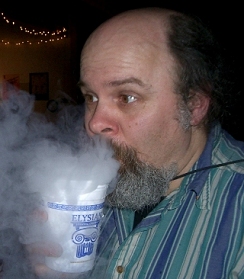| Sound, Space
and Strangeness
Wednesday, December 7th, 2005 at 7.30 pm
Center on
Contemporary Art, Seattle, WA
All ages, admission is free (donation to CoCA suggested)
|
 |
Michele Boland, Making
Music the Zundelphone Way, or, Silly Things to do
with Leftover PC Bits: In this talk, Michele
Boland will describe the initial vision for the ZundelPhone
and the path that led to the final expression of this
vision. In the course of this talk Michele will discuss
what she learned about cheap and easy ways to hook
up things to a PC, how she ended up with a surprising
selection of software to develop this project (and
how it worked overall) and then she will reveal the
secrets of the mysterious Zphone musical algorithms
(with a little discussion of classical music theory
and digital sound processing basics). Finally she
will summarize what she felt worked, what didn’t
and what she learned along the way. More about Michele
here and below.
|
 |
 |
Bill Beaty, An
Encroachment of Intrusive Absurdities: Bill Beaty
presents a gaggle of concepts on which he is either
currently working, or has been unable to dismiss from
perpetual consideration. The short list:
• Electromechanical fashion statement headgear
for the nerdier-than-thou
• Recording of gallery visitor spacetime traces
in Zinc Sulfide and violet LEDs
• Thumbnail calculations involving buoyant
drifting massive sculpture
• Correcting the weight-distribution of buoyant
objects
• Video glow sphere
• Harnessing our delusions arising from gazing
at dark water as the ferry leaves the dock
More about Bill and his projects at amasci.com/art/;
amasci.com
and below. |
 |
 |
Michael J. Laine,
String Is A Very Important Thing – Space
Elevator Update: Michael J. Laine, founder of
Liftport, the Bremerton-based space elevator company,
returns to dorkbot to tell us about their recent tests
and next steps for the space elevator itself. In the
company’s words: “Liftport’s mission
is to build a complete space transportation infrastructure
with a focus on the space elevator. The subject of
research for more than a century, the space elevator
is a unique way to ferry cargo and people into space.
Recent advances in technology, most notably the development
of carbon nanotube composites, now appear to make
building it feasible. Initial research reports on
building the space elevator that draw upon these discoveries
have now been completed. As proposed in these preliminary
reports, the space elevator will consist of a carbon
nanotube composite ribbon stretching some 62,000 miles
(100,000 km) from earth to space. The elevator will
be anchored to a specially designed ocean going vessel
named, "The LiftPort" near the equator in
the Pacific Ocean, and to a small man-made counterweight
in space. Lifters (robotic elevator cars) will move
up and down the ribbon, carrying such items as satellites,
solar power systems, exploration probes, factories,
and eventually people into space. LiftPort's plan
is to take the concept from the research stage to
commercial development.”. You can find out more
at liftport.com,
and at dorkbot.org/dorkbotsea/dorkbotmtg12.shtml.
|
| |
and… |
 |
YOU!!! Yes, if you have a project – any project,
at any stage of completeness, an idea – any
idea, at any stage of bakedness, an artwork –
any kind of artwork at any stage of doneness, please
do bring it along to the dorkbot meeting and claim
your 10 minutes worth of fame after the presenters
and before the Rave-O-Matic starts an impromptu dance
party! |
| Michele Boland
is a software engineer currently employed by Microsoft
with an extremely eclectic professional background.
She is a musician, private pilot and sailor. Her current
fascinations include nixie tubes and building strange
electronic clocks that often employ vintage electronics.
Click
here for more info on the ZundelPhone.
Bill Beaty’s Artist Statement:
If "Art is the lie that makes us realize the
truth", then art contains far too much lying:
far too much of the shallow facade of technical expertise,
or, with luck, too much of shallow surface esthetics.
No matter the acclaim directed at certain works, usually
we detect nothing beneath their surface besides our
own psychological projections. The Quality within
a piece depends almost entirely on the perceiver,
and most art is one-dimensional in this way. But is
it even POSSIBLE to create Quality which is separate
from the Quality projected by a human audience? Let's
find out. My goal is to attack the universal trend
of art based on shallow facades and viewer-provided
interpretation. amasci.com/art
|
|